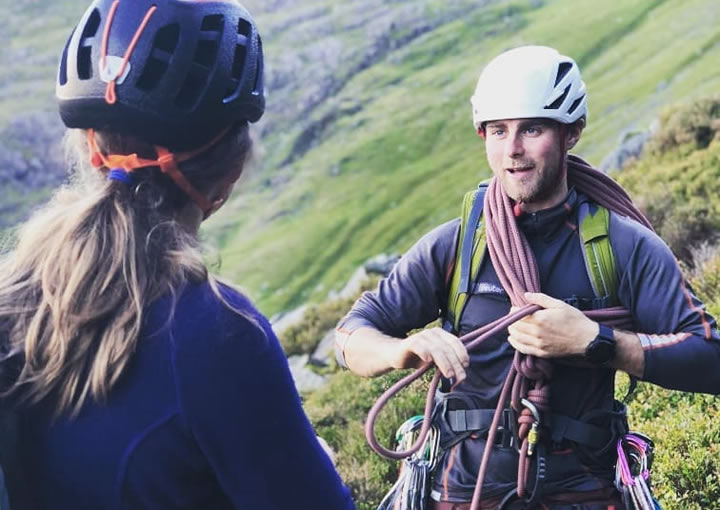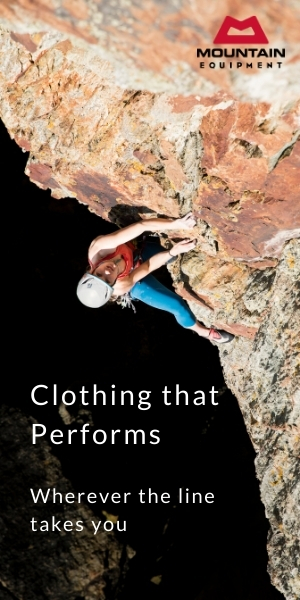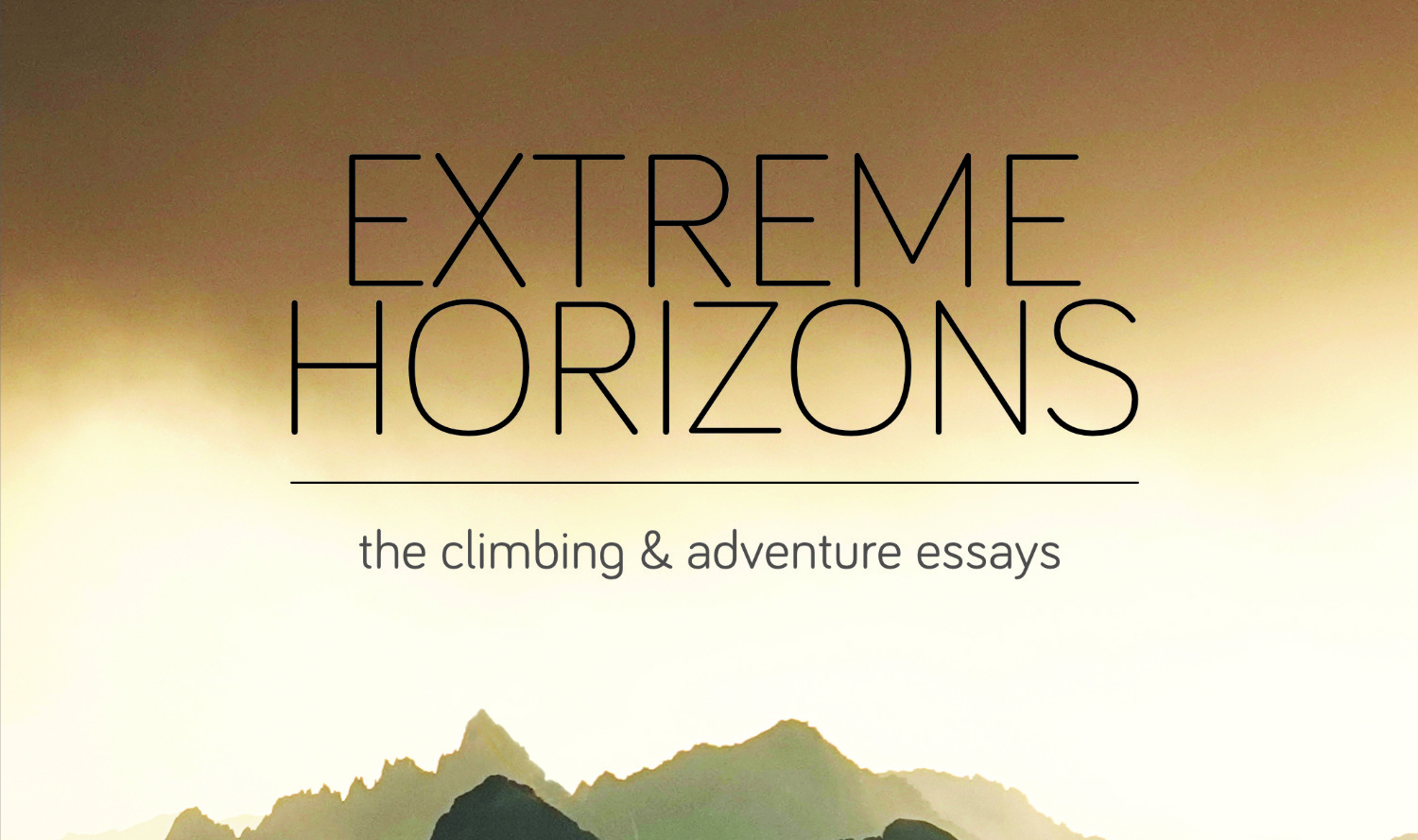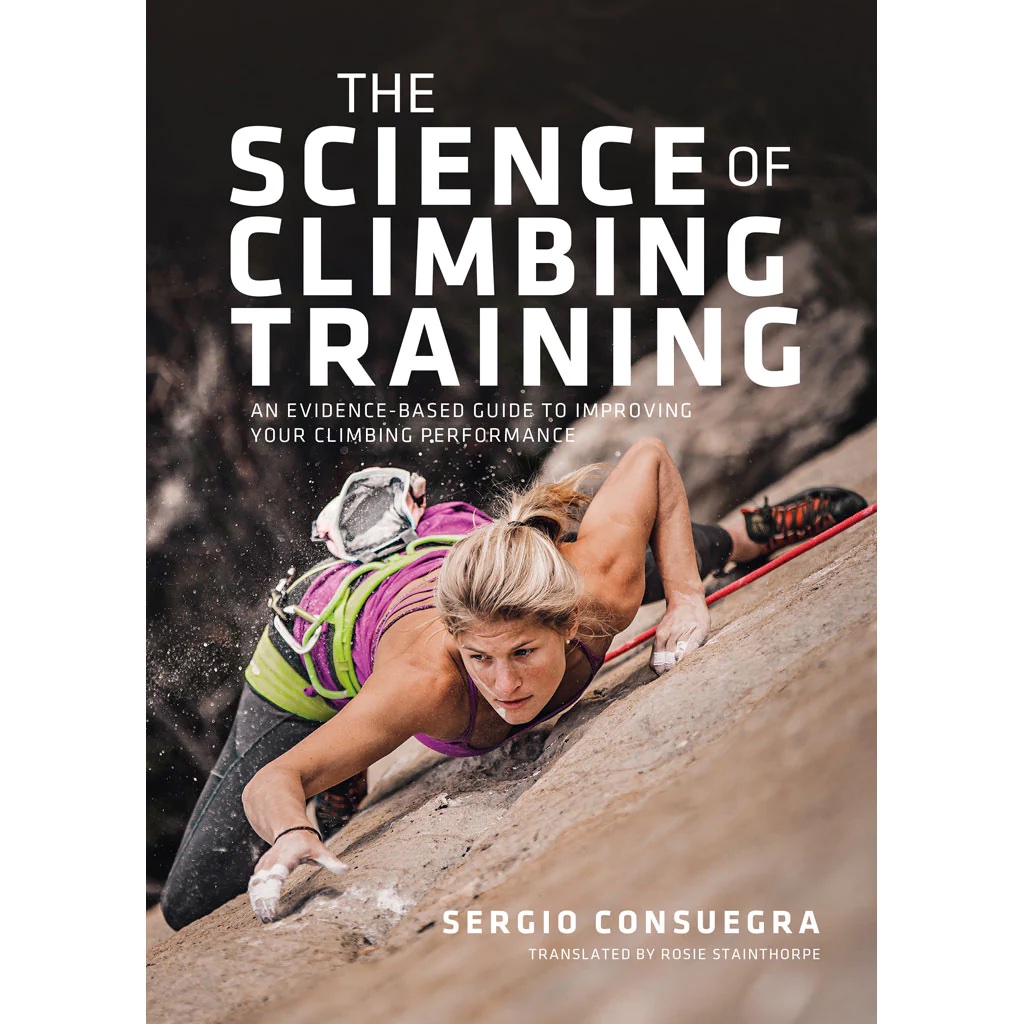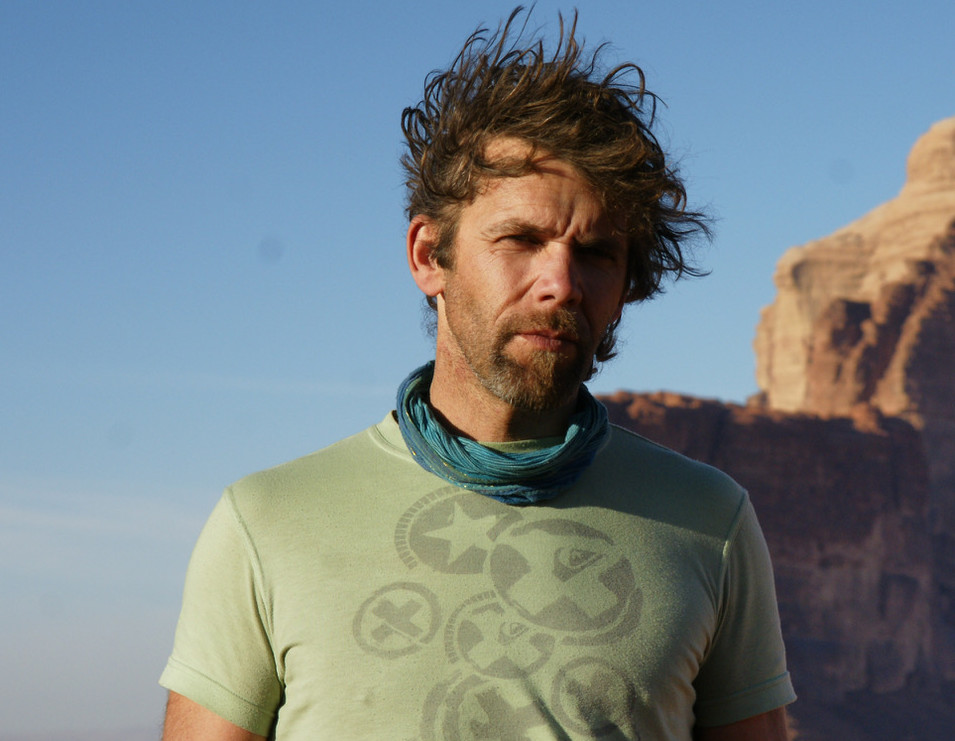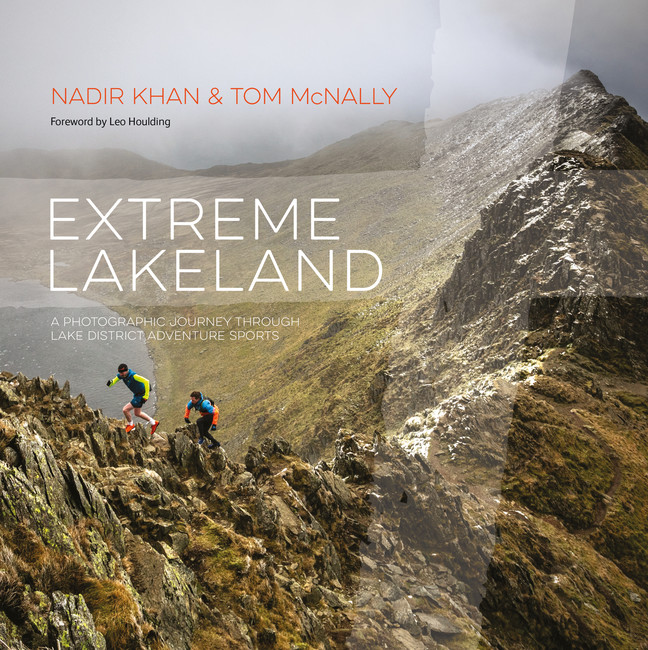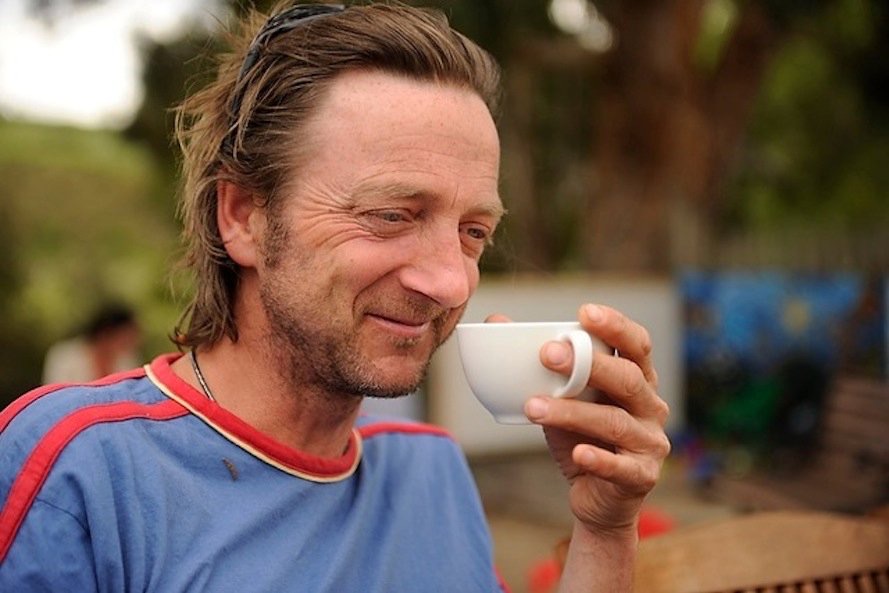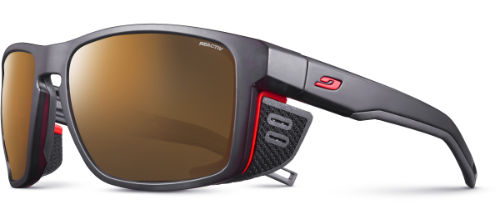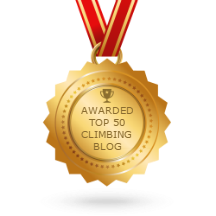The process of passing the Mountaineering Instructor Award takes time, commitment and sacrificing other goals, in this article Alexander Kay gives us an insight on his journey to a successful pass...
"My reward was passing well. More importantly, I positively reinforced the fact that success is no accident and I will put this mindset into everything else that I do."
Getting my life back... Personal reflections on passing my MIA
This year I experienced true commitment and hard work paying off, something of which I had experienced before, but not to the same degree. A few weeks ago I passed my Mountaineering Instructor Award and ‘got my life back’.
The reason I say that was not due to the fact that my life was rubbish before finishing off my MIA, nor for the fact that it became less meaningful afterwards. The honest reason is simply due to the fact that throughout the whole of this year I committed every spare second that I had towards it, right up until the proud moment I shook the course director’s hand.
Ok, so not every day was I physically scrambling up a mountain or managing a stance on a multi-pitch climb. But every day I thought about it. Or, to put it more truthfully, every day I couldn’t stop bloody thinking about it. Whether it was reading a relevant article, making notes in my guidebook, typing something down on my computer - a document on teaching navigation progressions, or a framework for profiling students -, or scrutinizing with my house mate over whether it was best to use the live rope or the dead rope to attach two clients onto an anchor from guide plate mode. Every day I nerded out in some way, voluntarily or involuntarily, to get me closer to having the experience and autonomy that I required to pass.
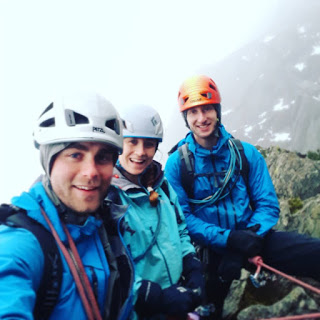
Scrambling on Tryfan in February
Now that might seem a bit far-fetched and a little bit extreme. It probably was a bit extreme, looking back. But those that know me well enough will know that I have always been over-prepared for assessment courses, and would believe me when I say that I genuinely didn’t go a day without doing something towards it. My house mate will certainly confess to that and I am also more than happy to show you any of the countless documents that I made; Tirelessly scratching my head late into the night, reflecting and theorising on various topics - you could host a bonfire with the amount of scrap paper I worked through.
At the start of the year I finished my IML. Entering into my final assessment was without an overriding sense of nervousness, instead, an excitement to share the knowledge that I had gained and an enthusiasm to prove my capacity as a leader in that environment. Days leading up to my assessment became somewhat like a broken record, heading out to practice things I had already practiced twice-over on the previous day. I knew I had done enough.
The MIA felt somewhat different. Throughout the latter half of the year I was really keen to step up and take on the week, but I never quite felt ready… Even the week before my assessment, sure with the amount I had done I should have felt like I was going to breeze it. But even then there were still some things floating around in my head that I felt I should have known better, should be able to do more efficiently, should have done by now. My peers told me that I’d done enough, yet I found that even in the final days leading up to the assessment, I was still doubting myself. I did well to quickly shoo away any thoughts of ‘smashing it’, or ‘cruising the week’.
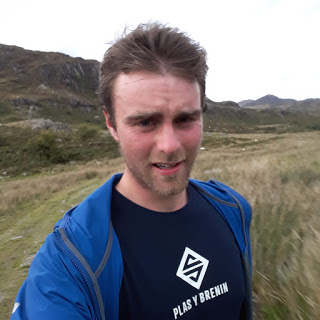
Still having doubts after a solo nav session only a few weeks before assessment
Ultimately I could keep people safe and perform at the standard required. I knew that. I think… I had proven that all year to myself, the people that I’d looked after, and to my friends and colleagues. I sometimes accepted the fact that I had done plenty of prep and that the notions of good luck from peers, although a very welcome gesture, were neither here nor there, for I had made my own luck, and if I were not to pass then I could only put it down to a silly mistake… However, all of the doubts in my head surely made me feel that maybe I still wasn’t quite ready, to be awarded the highest qualification for instructing in the UK mountains in summer conditions. I was certainly thankful for the offers of good luck when these doubts crept in.
Even to this day, I still think that maybe to have had those doubts, after all that prep, meant that in fact I wasn’t ready after all and that I therefore shouldn’t have passed. Did my assessors miss something? How could I have still been in doubt after solely concentrating on my MIA for the whole bloody year? Surely I should have been totally confident by now.
However upon reflection, I was ready and I had done enough.
Now that I’ve had a few weeks to think it over, it’s clear that it wasn’t doubt that I was experiencing, instead it was the fear of failure. I knew all along that I had done enough and if I were to stay concentrated, then the tireless amount of work and effort I had put in would pay off. The time I had spent in the mountains throughout the year, the places I had been, the things I had seen, the things I had heard; The experience I had gained. All of those things were backing my chances.
Yet the pressure I had now put on myself by having done all of the leg-work, was massive. With good friends and respected colleagues having already succeeded, even just a week prior to mine, I must admit I did feel an added pressure to perform and to not go and do something stupid and @!#* up in front of my peers. But the pressure only came from me.
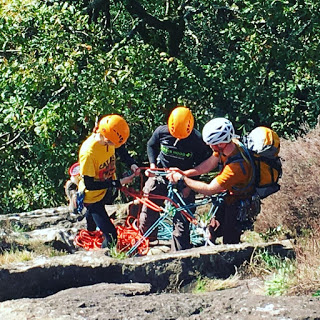
Teaching day on my MIA assessment
I had decided in my head that to not pass was a complete failure. This fear of failure was completely unnecessary and unhealthy. For failure would only have been found in not trying and I truly had nothing to lose, at least nothing worth worrying about. But the thought made me sick to the stomach. None of my friends or colleagues would have looked at me differently were I not to succeed, for I would be no different, MIA or not. Still human, still a man, still honest and a bit melodramatic. But I had convinced myself otherwise and I was at least sure that I would think differently of myself, were I to let all of my hard work go to waste.
In hindsight, although it was shit at the time, I am thankful for that sick feeling every morning, that neither Eminem nor dirty grime at maximum volume could shake.
For in fact, it provided me with a notion that blocked out any feelings of familiarity that I had gained up until this stage. By this stage I was so autonomous in the systems that I used and in the processes I followed for making decisions, that this sick feeling acted as a reminder to not totally trust in my autonomy when under pressure. By this stage I was unconsciously competent in the things I did. But during those 5 stressful days it would see me right to be consciously so.
Don’t get me wrong. By no means am I saying that I was familiar enough within my systems to start teaching on an MIA training course and nor will I say that everything I did during the week was the best way that it could have been done. What I was experiencing was a reminder to not become complacent; To avoid feeling too much like it was ‘just another day in the mountains’. Even if by then, that’s all it was…
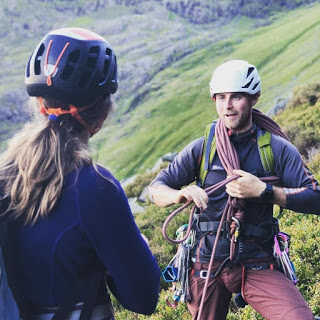
Another day looking after people in the mountains
That’s the thing with this assessment. You can go a year in the mountains looking after people, teaching people, going climbing, not getting tangles, but the tricky thing is that you have to prove it within those 5 days. Unfortunately if you find that the pressure gets to you and you make a silly error, then ultimately you have to accept that. And unfortunately, although the assessor can empathize, they have a duty to you and anyone you work with in the future, to give you the result you deserve. Sure, this is an assessment of your technical ability, your judgement and your understanding, but in its own right it is an assessment of your ability to withstand 5 days of working at the highest standard, in all weather. To a degree you’ve got to prove that you’re made of tough enough stuff, not only physically and technically, but emotionally and mentally.
This is was what I feared the most - making a silly error under pressure which would cost me my result. But it was ridiculous to look at it in this way, because should this have happened, then it should have only been seen as a positive thing, for I would have gained so much in learning that I may have been susceptible for faulting under pressure.
A few days prior to my assessment a fellow colleague sent me this message: “…go with your gut feeling, because when working alone it’s all you’ve got. If your gut feeling is wrong that’s worth knowing about more important than any assessment”. I would urge anyone else going through the award to really understand this. Buy into your assessment being continual professional development, for that is all an assessment really is - a confirmation of skills and an opportunity for further learning to take place.
However, confirmation of skills and further learning can only be given to those who have dedicated the time to practicing and therefore have provided themselves with the opportunity for this to take place. For those who have not done enough prep, the learning opportunities may be fewer and farther between, with further time and energy having to be given towards getting the basics right. The difference between turning up and have your skills confirmed, to turning up and seeing whether you’re good enough, needs to be acknowledged by everyone involved in this award, especially yourself. I do believe that, had I not been so prepared, then I would have struggled to maintain the capacity to learn during those 5 days, and instead just survived the experience.
The message from my friend really summed it up and was gratefully received, however I would have done better to appreciate it earlier, and even more so at the time, rather than getting clouded by unnecessary pressure.
Your assessors want you to succeed. Of course, they have an overriding duty of care to tell you whether you are at the standard or not, which may end up with you receiving the result you don’t want yet may need. Ultimately they want to see people do well. Even more to that, they are hoping you will turn up and give them the opportunity to not only assess you, but to further develop you.
You will undoubtedly do things differently to your assessors, because we are all different. Yet that is the beauty within this award, for you can share ideas and learn different ways throughout your time in the mountains. You are undertaking the highest qualification for instructing in the UK mountains in summer conditions. You will be experienced enough to choose what is appropriate and what is safe, whether that is slightly different to one of your assessors, or exactly the same. You may choose to place a different piece of gear, have another way to solve a scenario, or tie your second client onto the rope with another knot. Ultimately it needs to work and fundamentally it needs to be safe. You are turning up to be assessed as to whether what you do, works. You are not turning up to be assessed at copying what someone else may have shown you on a workshop. By the time you turn up to assessment you should be confident in what you do and in the reasoning behind your decisions. Turn up and do what you do. The team of experienced assessors, with years of experience to draw from, can determine whether that is at the standard or not.
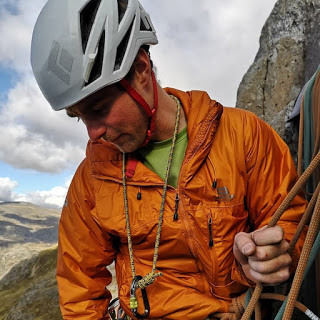
Taking two people on the classic 'Direct Route' on Glyder Fach
And that is why experience is key. Judgement, for the application of skills, can only be taught to a certain degree. Decision-making cannot be learnt from a book. An instructor can give you a toolbox, but when to apply the right tool at the right time has to be learnt through experience and challenge. Without a plethora of experience to draw from, you may find yourself less able to make the right decisions on the day.
If you feel you are at the standard, then entering into the assessment and viewing it as a learning process, will ease the effect that a defer or a fail may have on your self-confidence, because fundamentally that is the result you need at the time and should be seen as a good thing. Beyond your assessment you won’t have anyone else on your shoulder, telling you whether what you do is right or wrong. There won’t be any room for making an error on the day 4 of a 5-day ‘Cuillin-classics’, because you are tired or under pressure. Nor will there be any back-up should something go wrong on the fourth pitch up with two clients. You are better knowing that when you are given the OK to be let loose with other members of the public, then you have the skill and stamina to do so safely. And if it is not time for you to receive that OK, then that is what you are paying the assessor to do - It is their job to tell you that, whether they want to or not.
Throughout the year I worked on the Instructor Scheme at Plas Y Brenin. I was in the fortunate position of working alongside instructors who operated consistently at the standard, as well as training and assessing the award. I had many fantastic instructors around me, to bounce ideas off and ask questions to. I got the chance to work in new environments, given feedback by colleagues & exercise within an MIA capacity under supervision. I learnt a great deal off all of them and broadened my experience because of it.
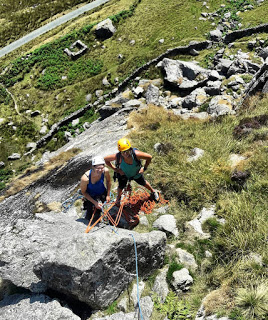
Taking two people climbing at Clogwyn Yr Oen whilst on the Instructor Scheme
But the MIA wasn’t a ‘done thing’ just because I was on the scheme. I still had to be committed in my spare time, putting in the effort outside of what was a highly-stressful year of new & exciting work. On top of countless, forgotten evenings, I managed over 60 personal days, consolidating and practicing various aspects of the syllabus. Doing this constantly on every day off was mind-numbing & exhausting and I could happily argue that it would have been easier to go through the MIA whilst not holding down a 9-5!
What was beneficial though, was having the chance to reflect on feedback I had received from my colleagues and put this into practice on my days off. I would implore anyone else going through the MIA to seek out similar opportunities prior to their assessment. Whether it be through a mentoring process or through workshops with known assessors & trainers, create your own luck by getting feedback (the more constructive the better) and putting it into practice before the time comes. I have no doubt that, whether on the scheme or not, I would have put in the same dedicated effort this year and sought enough confirmation prior to my assessment to get the same result.
Alongside all of the tips and tricks I picked up from fellow instructors, one thing I thoroughly enjoyed was getting to know them. And one thing that was highlighted to me throughout the year was that the rumours of intimidating assessments, harsh assessors and people trying to catch you out, are all false. Now you may be reading this thinking well that’s easy for me to say now that I’ve passed, or that I’m biased for having worked alongside them. But to really stress the point, I am being totally honest when I say that even I, having worked alongside them for a year yet never been assessed by them, still had some pre-conceptions of certain assessors and these were quickly overruled on the day.
Appreciate this: In terms of intimidating assessments, the MIA is certainly one of those. I felt intimidated by it. But never because of an ‘atmosphere’ that was created, nor because of unnecessary pressure being applied. I only ever felt intimidated because of the pressure I had put on myself to succeed. At no point, prior or during the assessment, did I ever feel purposefully-intimidated by anyone. If I'd have made a mistake, then the pressure would have mounted, but only from within. Fortunately, with all of my practice in the bank, this didn’t happen.
Harsh assessors and people trying to catch you out? That’s not true. Having just finished working alongside them for a year should be a fairly good reason to believe me. I have honestly never felt surrounded by so many people who want others to do well, nor spent time with people who have such an in-depth understanding in their craft (and subsequently the required standard at assessment). Please don’t get me wrong, this is not to say that these types of people don’t exist in other areas of the industry - far from it.
My assessment was fair and brilliantly-delivered. My assessors gave me the time and space to think, structured things clearly and, overall, provided an extremely enjoyable atmosphere, one that was as relaxing as I could make it! Further to this, throughout the 5 days I furthered my understanding, learnt a few more things and developed as a mountaineering instructor.
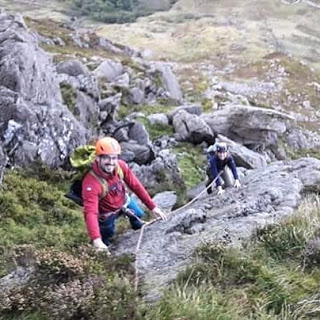
Colleagues and friends letting me practice with them on the rope
My assessors, colleagues and friends wanted me to succeed and wouldn’t have thought any different of me, whatever my result. Yet there was certainly no change in delivery of the course just because I knew them. If anything, I could argue that I was somewhat at a disadvantage with the thought of letting them down. Of my 4 assessors possibly reading this, you can fight it out between you as to who’s company I was in when I felt under the most pressure from myself to perform. I can happily say that the assessor I had my biggest pre-conception of was arguably the one who put me at ease the most.
So, what have I learnt throughout the process and what things did I do that eventually gave me the very best chance of being at or above the standard and also not faulting under the pressure?
Sadly, aside from sharing with you my experience of the assessment and hopefully highlighting the degree of practice one may need to dedicate themselves to, I can’t give you any golden buzzwords, nor specific rope lengths to short-rope with, or the particular way to set up a belay on a certain stance (although maybe a few of those now after the year I’ve had) or the best solution for solving a particular problem. But what I can do is highlight some of the key things that I did to prepare, as well as some of the key takeaways I’ve had and lessons I’ve learnt throughout the whole process, from start to finish.
I was guilty of doing my training too soon… I completed my training back in 2015 and I’m not fussed to say that I had only just scraped together the pre-requisites. In terms of climbing around the UK, I had done barely any - I hadn’t even been on Gogarth’s main cliff and I lived in North Wales?! I strongly believe that this is the main reason why it took me so long to go back for assessment. I struggled to get the best I could from my training because a lot of it was new to me, and cementing the things I had learnt was really difficult, because I didn’t have the experience to draw from to judge which tool to apply out of the toolbox.
So, before turning up to your training, seek out as many opportunities as you can to go out with more experienced people. Dedicate time to practicing areas of the syllabus, especially ones that you are less familiar with. Don’t end up learning it all on your training, like I almost did, as you may end up confused, overwhelmed and unsure of the application of various skills. My advice is don’t rush into it. Go above and beyond the pre-requisites and turn up a well-rounded and experienced individual.
I went out and took some falls... If I were to draw a graph of my experience from training to assessment, the major increase in learning would correlate with the time that I started pushing my grade on trad, taking more falls and really putting myself into environments that tested my mental capacity as much as my physical one.
Having pushed my grade meant that I was able to cruise VS. I had the space to think clearly and demonstrate a really solid performance. I treated it as my working grade and knew even in the poorest of conditions that I would be able to operate safely. My assessment went much more smoothly being able to climb at a higher standard than required. I’m not saying you have to climb anything harder to pass the assessment - you don’t. But I certainly found a huge difference in my performance when I was able to operate well within my comfort zone on a VS, rather than being at my limit. During the assessment you should expect to operate at this grade on any day that sees you climbing. Having no barriers to this was fundamental in my success.
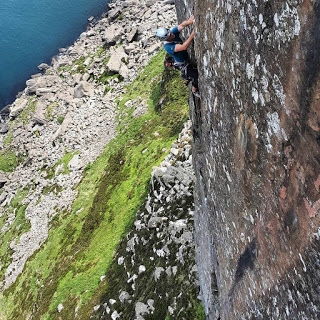
Pushing my grade at the Fairhead meet. Jolly Roger (E3, 6a)
Pushing my grade to the point where I would take leader falls on trad undoubtedly helped me to increase my overall experience and understanding as a climber and mountaineer. I could theorise the effects in certain situations, but to experience taking falls safely and being within a situation where a fall may occur, enabled me to see my systems truly working and provided me with numerous opportunities to further my judgement of risk/consequence. I also found myself having to improvise. I backed off routes that I couldn’t get to the top of, assisted seconds who came across difficulties and provided opportunities for myself to problem solve, retrieve gear, abseil etc.
Falling off usually ends up being for a number of different reasons, likely somehow relating to your climbing ability - your stamina, skill, flexibility - but also possibly due to poor planning and lack of tactics. Trying harder grades highlighted the weaknesses in my climbing technique and the need to approach certain routes tactically. I was forced to place gear more considerately and trust in those placements; gained confidence in carrying out wonderful sequences of movement above gear, moving fluidly into restful positions; was forced to extend runners to keep my ropes running beautifully. There were so many more benefits to climbing harder grades than just getting stronger and being able to hold on for a long time on a VS. Climbing above my previous limit opened doors to a whole new world, home to an ever-increasing tick-list of fantastic routes and learning opportunities.
I sought the chance to go further afield, to places where I found myself out of my comfort zone and implementing as many of my skills as possible. I challenged myself and coincidentally found that this was where the real learning took place. For my experience could only be furthered when my judgement of risk and consequence had to truly be applied. I purposefully visited scarier venues, more remote climbs, bigger sea cliffs and new mountain environments that made me think more and that required my partner and I to truly safeguard each other.
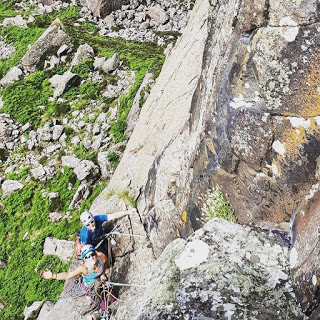
Seconding 'Wall of Prey' (E5, 6b), Fairhead - I fell off the crux 3 times and ended up prussiking...
Unfortunately, on one of my many climbing trips this year I witnessed a significant incident that would not only further my experience and cement my understanding, but would highlight the need to always be as robust and safe as possible, no matter what situation I am in. I observed a leader fall, of which the intensity was so great that the belay sustained significant damage and resulted in two climbers seriously hurting themselves. I wouldn’t call it a eureka moment, as I was already aware of the dangers of non-multi-directional anchors, upward pulls and leader falls, but to witness it with such severity was something that I will never forget. It will always act as a reminder to never stop taking this seriously.
Fortunately both climbers made a full recovery. I am not saying that to become a mountaineering instructor everyone has to witness incidents such as these, God forbid. But what I am merely trying to highlight here is the fact that within the last year, where I have gained more experience in my climbing career than ever before, have I matured in my understanding and judgement more deeply than ever.
The final thing that can’t go overlooked is the sheer amount of time I dedicated to the process. During the year I made the MIA my whole life. I committed myself to studying and practicing various syllabus elements at every opportunity. My thoughts to this were simple: To become a Doctor, I would have to take every opportunity that I had to further my learning. I would have to make sacrifices and I would have to re-order its position on my list of priorities. I told myself the same for this award. Realistically, I couldn’t have met the standard by only going climbing once a month and scrambling the odd day here and there. It demanded a total commitment. I had to eat, sleep and breathe it to give myself the very best possible chance of passing. Here are some of the more specific things I did, relative to each day of the assessment:
Taking People Climbing: I was reflective and put theory behind everything that I practiced within my personal climbing. Whether it was thinking about making myself as slick as possible at stances, or how to most neatly attach clients to anchors out of reach or within reach, even down to the level of working out from which side of the anchor to start with to use less rope. Maybe over-kill, but the proof came in the pudding during my teaching day when I managed stacks of climbing with two students and not a single tangle. Sometimes in the moment during physical practice it all got a bit confusing, so for me it helped to sit down with a pen and paper and draw things out. I did this with all aspects of my personal climbing even when I thought I knew it best. I definitely did things better because of it.
Rescues: When it came to rescue scenarios, I tried to avoid treating them too much like set pieces. Once again this is something that requires experience to draw from, rather than just throwing together a hoist and pulling on it for example, because every situation is different. Hypocritically however, I did initially begin by practicing the ‘set pieces’, working through them in a logical progression from simple to complex scenarios, until I was happy with the mechanics and knew the next steps I would need to take to resolve the problem. I then theorised once again, making up a document of the many different situations in which certain incidents could occur and the varying ways in which I could solve it. I scrutinized each solution until there were no possible alternatives and reflected on how/why/when certain things would and wouldn’t work. I then put it all into practice. Lots of times, timing myself and making things difficult, in all-weather. Eventually hoisting someone and escaping the system and anything else I needed to do, became so autonomous and efficient that it allowed me to have the head-space and time on the assessment to decide exactly what I wanted to do and then carry it out calmly and methodically.
Mountaineering: To improve my scrambling I took out real novices, which forced me to look after them appropriately, rather than spending too much time with peers and fellow aspirants on the rope who I could too easily forget to ‘look after’. I revised my briefings to clients, making them as efficient as possible and played around with rules of thumb for different types of ground/rope-lengths/anchors, never getting fooled into thinking I would find a definitive answer or a rule of thumb, but more so to further my experience base from which to draw from.
Teaching Climbing: When it came to teaching climbing, I gave myself the very best chance of picking the right venue to suit the clients wants and needs on the day. I ran around numerous venues throughout the course of the year, more for familiarity of the general area rather than knowing the technical intricacies of each route. This helped to ease my nerves on the day, for I knew the logistics of each place, much like you would in the real world if you had given yourself the chance to explore a venue before a working day. But don’t forget, as an MIA you should have the experience to draw from to manage any situation in any place, so don’t get too hung up on certain places or certain routes and be ready to make the venue work for the clients you get. To have the confidence to do this well, I purposefully took a whole range of people to a variety of places.
I practiced with all types of clients from novices to new leaders and created a document highlighting what beginners need to learn, right through to what improving leaders need, and married this to a list of venues and climbs that would work for each type of person. I made up a framework to help profile my students, so that I could marry the information they gave me in the morning to the experience level they appeared to have from first glance. I did a lot of these days and found myself to be very time-consuming, so I revised when and how I could make up on time to get as much climbing done within the day as possible.
Alongside annotating guidebooks, I kept a separate book where I recorded various bits of information regarding the environment or history of an area/crag that I visited, which I then studied more about when I got home. In my guidebooks, I wrote down various route link-ups for different learners - quick-hits at the end of the day to maximise on teaching time. I thought of simple concepts to teach, such as hierarchy of ways to descend so that I could pass information on in a structured and logical fashion.
Navigation: Finally, I went out and practiced my navigation. A lot. This would have been far too easy to overlook, but is a crucial part of the assessment. I went out for long periods at a time, up to 4 hours of intense micro navigation in steep terrain and practiced with friends who had recently been through the assessment, to ascertain whether I could operate at the standard or not. I theorised on various ways to teach navigation, made documents on various progressions so that I could be totally autonomous when it came to doing it myself. And I didn’t forget about the poor visibility nav, because on the day I knew I would be assessed in whatever the conditions.
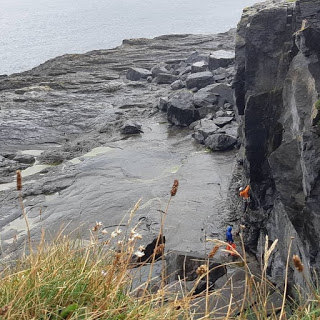
Starting up, and subsequently backing off, a gopping-wet VS at Ailladie
My reward was passing well. More importantly, I positively reinforced the fact that success is no accident and I will put this mindset into everything else that I do.
Further down the line, when I am consolidating towards my MIC and times get tough, I will look back and remind myself that there is no rocket science involved, just a sheer will and determination to succeed. I won’t be rushing into my training like I did with the MIA. I want to be entering into MIC training as close to the standard as I can be, learning little and confirming the things I should already be able to do. I will get the most out of my training and will find the whole process beyond that easier.
And I have learnt that unnecessary pressure is only so necessary - it kept me on my toes, but was fairly unhealthy. I will continue to put pressure on myself, but do a better job of keeping it under control. I am grateful to have experienced it, but my next assessment won’t be the same - although I will certainly commit the same dedication to practice.
Right, considering that I now have my life back, I’m off climbing...
Read more from Alexander Kay

